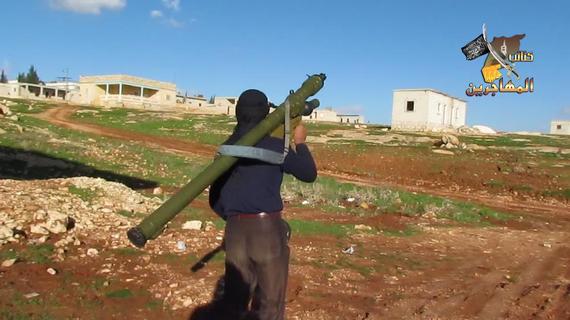This is the seemingly impossible policy question that the Obama administration is currently trying to answer. And the choices that are being offered to the president and his national security team are filled with as many negatives as positives. In other words, whichever decision is made, there are going to be consequences that could potentially impact America's national security in the broader Middle Eastern region.
With the Syrian-Lebanese border now largely controlled by pro-Syrian government forces, barrel bombs continuing to rain on civilians from the sky without warning, and Bashar al-Assad himself starting to "campaign" for a third term as Syria's president, the mere fact that the White House is now debating more lethal assistance to Syrian opposition forces is a perfect metaphor for the administration's internal frustration over Syria policy.
The Wall Street Journal reported over the weekend that a small shipment of sophisticated anti-tank missiles have already been sent to carefully vetted Syrian opposition forces in what can only be described as a pilot program by the United States and Saudi Arabia. That is, if the people who receive the weapons keep them in their hands and limit leakage, a greater quantity of them could be sent.
But President Obama may be ready to go further than that. Time magazine's Michael Crowley writes that the president is at least thinking about sending anti-aircraft weapons to curb the kind of devastating -- but highly effective -- barrel bomb attacks that the Syrian air force has relied on for the past several months to clear opposition controlled neighborhoods.
"A former CIA director has called them "our worst nightmare." A 2005 study found that just one could blow a $15-billion hole in the world economy. And the Obama Administration is thinking about sending them to Syria.
They are shoulder fired anti-aircraft missiles, capable of knocking helicopters and low-flying planes out of the sky. Syria's rebels and their Arab government backers insist those weapons could decisively reverse the momentum in Syria's three-year civil war, which may recently have shifted in favor of Bashar Assad's regime."
The query for President Obama on this subject is the same as it's always been: whether the benefits of sending MANPADS to Syria's moderate rebel battalions is worth the potential costs -- whether, for instance, the same weapons used to shoot down Bashar al-Assad's fleet of helicopters and jet fighters could make their way into the hands of one of the 8,000 or so jihadist fighters operating in Syria today. This was the concern that prompted the administration to veto a proposed Saudi plan to send a limited number of MANPADS into Syria earlier in the year. Crowley's story suggests that the White House is now revisiting the Saudi plan.
Fortunately for President Obama, he would have some congressional support if he in fact decided to pursue a MANPAD pilot program. Sen. John McCain has been voicing strong support for more aggressive U.S. action to stop the bleeding of civilians for years now. But more importantly, the Senate Foreign Relations Committee passed a bill in May 2013 authorizing the president to send defense articles to the moderate Syrian opposition. That bill, passed in a 15-3 vote, prohibited shipments of anti-aircraft weaponry, but also allowed the president to exercise his waver authority if he sees a vital national security interest in doing so.
Syria gets more complicated for the White House by the day.

